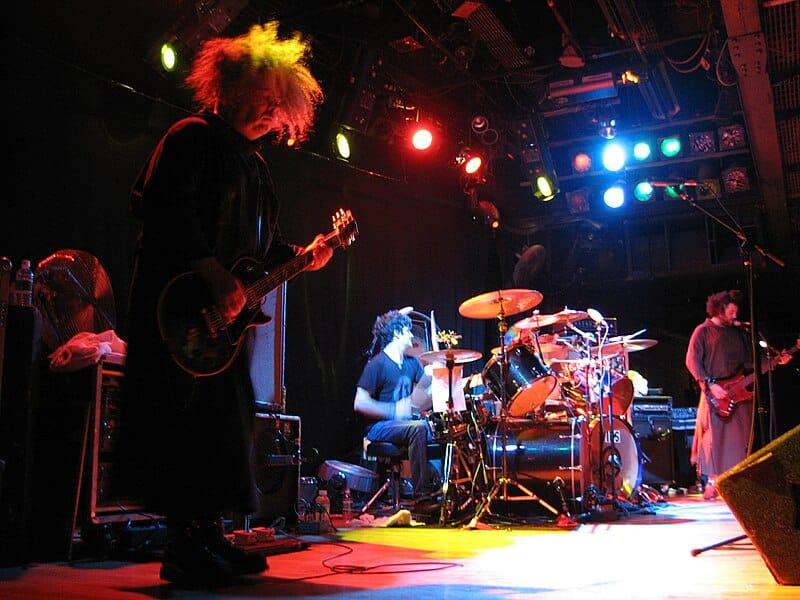
Eventually, genres give rise to subgenres. For example, grunge started as an underground subgenre that combined elements from hard rock, punk, and metal and welded them into a new (sub)genre.
While it is impossible to pinpoint when and even by whom the genre was started, it is safe to say it morphed into the signature sound of the late 1980s and early 1990s. And no, Nirvana did not kickstart the movement; they were instrumental in it later.
First, we’ll look at the origin of the term grunge, and following, we’ll look at some of the pioneering bands who helped to shape the music and drive it forward.
Who Invented Grunge Music?
Grunge as a Term
Music commentators and radio hosts used grunge in the late 1980s to refer to a soundscape found in music from Seattle, Washington, and surrounding towns.
With high levels of distortion on the guitars, fuzz effects, feedback, and a fusion of metal and punk influences, this new sound needed to be defined. Grunge fitted this perfectly. Many bands with this signature sound were on the Sub Pop or C/Z labels.
But how did a word that’s a synonym for dirt or grime become associated with music? Mark Arm used the term in 1981 in a letter where he nominated his own ‘band’ Mr. Epp and the Calculations (more about them later) as the most overrated band in Seattle.
Mark Arm wrote: “I hate Mr. Epp and the Calculations! Pure grunge! Pure noise! Pure sh*t!” (emphasis added, quoted in Loser: The Real Seattle Music Story).
In 1987 the word was applied to musicians when Bruce Pavitt, co-founder of Sub Pop records, described Green River’s album Dry as a Bone as having “gritty vocals, roaring Marshall amps, ultra-loose GRUNGE that destroyed the morals of a generation” (source).
The main reason for Seattle’s and other northwestern American bands is because recording an album was expensive, being unfamiliar with recording procedures.
An overall lack of professionalism could also be seen as a possible origin for the term grunge, referring to the ‘dirtiness’ of the sound. Although, punk’s DIY attitude as an antecedent to grunge, some of the ‘dirtiness’ in the sound could also be attributed to it.
Grunge Pioneers
There are many origin stories regarding who the first genuine grunge band and performers are, and we’ll look at some of them below.
Jack Endino is regarded as the so-called ‘Godfather of Grunge’ because of his association between 1984 and 1989, recording bands like Blood Circus, Green River, Nirvana, and Soundgarden. We’ll examine some of the earliest grunge pioneers below.
- Wipers (formed 1977)
Greg Sage formed Wipers in 1977 and, according to Lauren Schaffner at LastFM.com, is one of the first punk rock bands to employ a melodic element to their music that would become the blueprint for future generations of grunge bands.
Their debut album, Is This Real, was released by Sub Pop in 1980. Their third album, Over the Edge (1983), firmly established the raw, gritty grunge sound.
- Melvins (formed 1983)
Although the band Melvins deny that they influenced the punk scene, they are frequently cited as one of the major influences.
Buzz Osborne, the guitarist and frontman of the Melvins took his bluesy, hard rock, and punk influences and slowed them down to develop a new sound. And it worked like a charm.
- Mr. Epp and the Calculations (formed 1980)
Remember Mark Arm describing Mr. Epp and the Calculations as “Pure grunge! Pure noise! Pure sh*t” back in 1981 when we were discussing the term’s origins? The band was active from 1980 until its demise in 1984.
You can listen to their album Ridiculing the Apocalypse and decide whether the band can be regarded as a ‘proto-grunge’ or if they were making a joke.
- Tina Bell and Bam Bam (formed 1984)
Often women have been overlooked in the music world. However, the grunge scene was slightly different, with numerous female acts, yet still not as many as their male counterparts. Riot Grrrl helped elevate women in the world of rock, but it was still very much a White male-dominated world. Tina Bell defied all the boundaries—she was Black, female, and the frontwoman of a grunge/rock band. Bam Bam was formed in 1983 in Seattle with Tina Bell heading alongside her husband Tommy Martin as guitarist and Scott Ledgerwood on bass. Matt Cameron was the drummer and later joined Soundgarden and then Pearl Jam. Tommy Hendrickson replaced Matt Cameron as the drummer.
Tina Bell is regarded as the ‘Godmother of Grunge,’ yet she never received the recognition she deserved. Tina was often overlooked by record labels and those in power in the music industry.
As a result, she did not get the same offers as her White male counterparts. Ground Zero, recorded in 1984 by Bam Bam, certainly exemplifies the grunge sound in the guitars. In their song Stress Tina shows off her vocal talents against the raw, gritty guitars.
Conclusion
While we cannot pinpoint or credit a single band as the inventors of grunge, a few have pioneered the sound.
Bruce Pravitt used the term in 1987 while writing copy for Sub Pop records, and Mark Arm used the word to describe Mr. Epp in 1981. Mr. Epp can be seen as a type of ‘proto-grunge’ because of their DIY approach to music.
Wipers moved things along, swiftly emerging from the punk scene. Bam Bam’s Tina Bell stands out today as the Godmother of Grunge, and this early band certainly did lay down the track others would follow. The term itself was never formally adopted or liked by musicians in Seattle.
Instead, writers, radio hosts, and academics use grunge to describe the sound originating in and from Seattle’s underground scene. Grunge was initially used as a slur but eventually grew to encompass a whole and important subgenre in rock music.
Further Reading
For more information on the influential bands and a list of the best grunge albums of all time, head to LastFM.com and check them out.


An informative and decent article. BUT *the* Godfather of Grunge is missing…Kim Salmon. Cheap Nasties, The Scientists, Salamander Jim, Kim Salmon & the Guys from Mudhoney, Beasts Of Bourbon, Kim Salmon & the Surrealists, the Beasts & more. The Scientists is where grunge began, before grunge was beyond how our parents may have described our hair after creating mud pies. Look no further than the Scientists and thank you for your time.